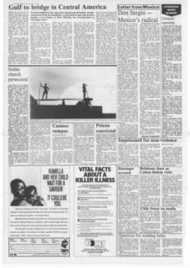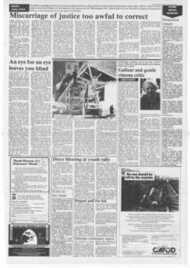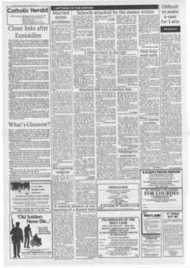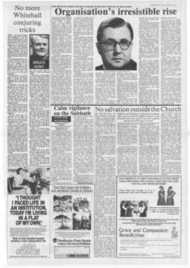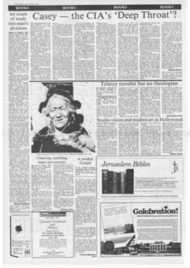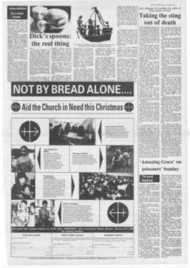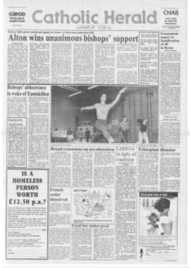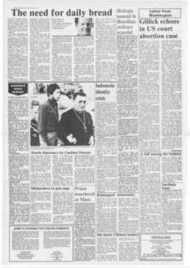Page 5, 13th November 1987
Page 5

Report an error
Noticed an error on this page?If you've noticed an error in this article please click here to report it.
Tags
Share
Related articles
Re-christianisation: A First Public Priority
Uestions Of The Week Icatholic Profiles: 781 By Michael, De
The Rebirth Of Catholic Education
At Your Service By Douglas Hyde
De—christi Anisation
Organisation's irresistible rise
"WE HAVE the great ambition of sanctifying and Christianising the institutions of peoples, science, culture, civilisation, politics, art, social relations. Everything ought to be Christian, as a collective social expression of the faith of men and as a means to save souls, to sustain them in their faith, to lead them to God". From: Cronica, Opus Dei leaders' journal.
Opus Dei (the Work of God) has gradually become a strong backwards-looking force in the Catholic Church. With a judicious strategy developed after the second Vatican council at the Centro Romano di Incontri Sacerdotali (CRIS), the Opus Dei priests' centre in Rome, it has proved increasingly successful in winning sympathisers at the top of the Church as well as influence in the Vatican.
Unknown to many people, it continues its irresistible rise, In Camino, his main work, the Spanish priest Josemaria Escriva de Balaguer y Albas (1902-75), the founder of the organisation, earnestly counselled his followers to use discretion: "Perhaps it is not the point of your weapon but at least it is the handle".
The constitutions worked out by Escriva which have applied to the secular institute Opus Dei since 1950, made secrecy regarding members' names a duty. The statutes of Opus Dei, which were issued in 1982 when it was given the hitherto unique status of a personal prelature by the Pope, and which Escriva had prepared in advance, allow this practice of secrecy to continue.
But neither handle nor weapon can be concealed entirely. An indiscretion of 1979 brought to light an unpublished document in which Alvaro Del Portillo, the organisation's leader, recommended that the Holy See should make the secular institute a personal prelature "cum proprio populo", to some ecclesiastico-political advantage. It would be possible for the Holy See "to enjoy more efficient access to a mobile body of (aptly prepared) priests and laity who would constitute a universally effective spiritual and apostolic ferment in Christian life, above all in society and in vocational life, where it is not often easy nowadays to have an apostolically incisive effect with the means usually available to the Church."
With extraordinary precision, Portillo listed successes to date. In 87 countries Opus Dei had altogether 72,375 members. There were members in 479 universities and further education institutes over five continents; in 604 newspapers, journals and scientific publications; in 52 radio and TV corporations and so on; in 38 news and publicity agencies; and in 12 film production and distribution companies.
These numbers have probably risen in the meantime. In West Germany alone, the membership, which was about 700 in the seventies, has more than doubled. Opus Dei is most strongly represented in Spain with some 30,000 members, followed by Mexico (7,000) and Italy (5,000).
Unfortunately the document said nothing about the political arenas of the mobile corps, which is working for the Christianisation of the world. We know, however, that in Franco's Spain several ministers were Opus Dei members. Today too it has parliamentary members in western countries. It has often been reported from Chile that the financial circles of Opus Dei had considerable influence on the thinking of the dictator Pinochet.
Any outsider who wants to verify information of this kind in Opus Dei sources will not be shown statistics but will be referred to the main concern of the Work. Like Jesus in Nazareth, Christians should sanctify their work and mundane life in quite everyday vocations.
This religious attitude is unexceptionable. There have always been laypeople concerned with everyday sanctification.
To that extent Escriva's spiritual initiative may be located in a broad current of contemporary secular devotion. Admittedly, Opus Dei stressed something which Vatican II also brought out: the vocation of the laity. Moreover Opus Dei members, like all Christians, are entitled to live their religious conviction in secret.
But Opus Dei as a whole is a mobile corps, an ecclesiasticopolitical and socially ambitious institution which ought to be interrogated about its goals and its influence. The prelature, however, maintains that it has no secular, and certainly no political ambitions.
Radio Vatican itself has contradicted this assertion. It is said to be "pointless to deny that Opus Dei in certain countries exerts considerable influence in political, economic and cultural domains." Yet Opus Dei would object that it is not the organisation but only the individual member who is socially active.
Nor does the question of social levels get us any further. The Work often quotes this triad from its spiritual garner: "To sanctify work, to sanctify oneself in work, and to sanctify others through work".
Does that mean that Opus Dei does not include the unemployed and the poor of the Third World, who have no work, and therefore neither influence nor money? Or what proportion do they represent? Anyone who asks such questions would most probably receive this answer: sociology is inappropriate to the supernatural Work of God.
The supernatural character of Opus Dei cannot be reconciled with sociological models. There will be no pandering to such sociological reductionism.
The discussion stops here. Either one accepts the shining image of a purely religious organisation, and then empirical problems are superfluous. Or one continues to ask awkward questions and is rejected as a fit partner for dialogue with Opus Dei.
In view of this secretive behaviour, how can an outsider hope to say anything about the organisation? Together with Portillo's writings, constitutions and statutes, other secret papers have come to light. Above all there are the 140 leaders in the internal journal Cronica, which is made directly available to the celibate leadership.
Furthermore there are reports and books by former members, which arouse worldwide interest because they usually represent the internal life of the prelature as repressive, with its sinister modes of publicity, forceful indoctrination and rigid censorship.
What is the reason for these contradictions? Those who exert pressure and those who are under pressure do not experience things thus as long as they accept the rules of the game. They only become really aware that they made their decisions under possibly massive — pressure when they begin to free themselves from Opus Dei To be sure, it seems illuminating that Escriva, whose authority in Opus Dei remains unquestioned, demands "sacred compulsion" and "blind obedience" from his followers.
While there are several descriptions of the internal life of the prelature, there is hardly any information on the members' actual social activities. For the most part, the observer has to rely on chance snippets. He may happen on members whose identity has finally been revealed, on institutions which they founded, and on shady channels into which money disappears.
Even though members, within the "boundaries decided by the ecclesiastical hierarchy 'enjoy' the same freedom as other Catholic believers", there are distinctive common tenets and practices.
The English secular priest Vladimir Felzmann, who belonged to Opus Dei for 22: years, especially the authoritative priestly leadership, tells us that "Opus Dei itself isn't political". But the leaders purveyed a "restrictive" view, a "preconciliar" mentality and "an approach to life which then colours your decisions".
Next week: Leaders and common mentality of a mobile corps.
Peter Hertel was born in 1937. He studied Catholic theology in Munster and Munich, and became a journalist. He spent nine years as a national political editor, including a period with the German Catholic weekly Publik. Since 1973, he has been the religion and society editor of North German Radio. After many years of research, he published a book on Opus Dei in 1985. This article is reprinted from the current issue of Concilium, published six times a year by T and T Clark, 59 George Street, Edinburgh. Annual subscription £24.95.
blog comments powered by Disqus



